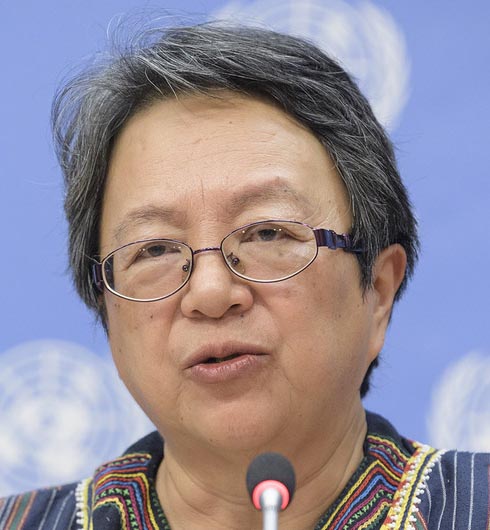STOCKHOLM (Thomson Reuters Foundation) – Indigenous peoples from the Amazon to the Arctic are being left out of the global conversation on water property rights, a United Nations’ indigenous rights expert has warned.
Speaking on the sidelines of an international conference on water in Stockholm, special rapporteur Victoria Tauli-Corpuz said indigenous people needed to be better “consulted and involved” with water projects to help stem the impacts of climate change.
Indigenous groups, for instance, have been affected by dams along the Mekong River in Cambodia, which have caused water shortages downstream, and by water pollution in the western Huehuetenango region of Guatemala, she said, but rarely consulted about projects.
“Indigenous peoples are the ones who are left behind,” Tauli-Corpuz, who became the U.N.’s special rapporteur on the rights of indigenous peoples in 2014, told the Thomson Reuters Foundation during an interview.
Such groups often have ancient knowledge about water systems which could help improve decision making, she said at annual World Water Week in Stockholm, which ended on Friday.
“The way indigenous people deal with water is something that has been developed through thousands of years so they have very, very sustainable systems of managing water,” she said.
“If indigenous peoples are not included then the contributions and their knowledge will also not be taken into account and that is a loss for society.”
Herself an indigenous leader from the Kankanaey Igorot tribe in the Philippines, Tauli-Corpuz said she had successfully fought the instillation of hydroelectric dams and water infrastructure projects that could have diverted irrigation from native lands.
The planned Chico River hydroelectric dam, for instance, which would have displaced some 200,000 people and destroyed burial grounds and rice fields, was canceled in the 1980s after protests, she said.
Water, she added, “is not just an economic resource it’s also a cultural and spiritual resource.”
Each year her indigenous group performs rituals on Lake Banao in the northern Philippines, seeking protection from deities for the ancient water source, she said – but they also ensure sanctions are in place for any damage to the lake.
The World Bank estimates there are about 370 million indigenous peoples worldwide, who make up just 5% of the global population but safeguard 80% of the world’s remaining biodiversity, with the land they live on often inextricably linked to their identity.
“The issue of water is very central for indigenous peoples because of course it’s related very much to their claims to their lands, territories and resources,” said Tauli-Corpuz.
The U.N. envoy said that customary laws and indigenous governance systems should be part of international systems to deal with climate, land and water crises and conflicts, of which she expects an increased number in the coming years.
Earlier this month a United Nations report on land and climate change for the first time recognized the land rights of indigenous peoples as important for curbing global warming.
The special report by the Intergovernmental Panel on Climate Change (IPCC), written by more than 100 scientists around the world, called for big changes to land use, farming and eating habits to help cut emissions that are heating up the Earth.
Tauli-Corpuz warned that water rights need to be “high on the agenda” for world leaders, and that indigenous concerns must be taken into account. “Indigenous peoples have to have a voice,” she said.










